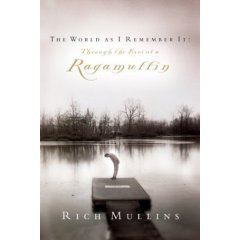I got to thinking about Mark this morning. Mark, whose mother was yet another Biblical Mary, lived in Jerusalem at the time of
Peter's miraculous prison-release. His mother must have been a sort of leader among the Jerusalem Christians then, because her home was where they gathered to pray during that emergency, and it was to that same home that Peter knew to go after his escape.
Later, Mark accompanies Paul and Barnabas (his older cousin) on their relief mission from the thriving church at Antioch to the church at Jerusalem, during a time of famine (
Acts 11:27-30;
12:25). And Mark is with them again at the start of their first missionary journey into Asia Minor, although early on he turns back for
unspecified reasons.
Mark seems to have been a sort of protege to his cousin Barnabas. It was Barnabas who wanted to give Mark another chance by taking him along on his and Paul's second journey into Asia, but
Paul would not hear of it. Paul was not convinced that Mark had become a man who could hold up under pressure, a man who would remain steadfast in the face of adversity. Paul refused to let Mark come along. As a result, Paul and Barnabas part ways, and Mark accompanies his kinsman on
a separate mission, of which nothing more is known.
I imagine Mark must have been a little discouraged at that point, perhaps even angry with Paul. But it was probably a good thing that he stayed on with Barnabas, who seems to have been
a gifted encourager. Perhaps encouragement was, above all, what Mark needed, for he had reason to doubt his own courage. You see, the turning-back from the first journey must have seemed a disheartening confirmation to Mark of a gnawing self-doubt that had deep roots--roots that went back in fact all the way to that night at Gethsemane, when the mob came for Jesus. That kind of memory never fades. There were flaring torches, angry shouts, the harsh metallic zing of swords from scabbards. And Mark, undoubtedly quite young,
simply ran for his life. Someone grabbed for him, grasping at hunk of cloth, coming away with the boys garment only, and young Mark found himself running naked through the cold Judean night.
I see him stumbling again and again in the dark. I hear his choked sobbing, his hoarse embittered breathing. His throat, his lungs, burn like fire. And finally, after what seems like an eternity, he staggers and falls. He is far from everything now, alone in the dark, and he simply sprawls in the dirt, covered in all that darkness, and knows himself to be the greatest coward, the worst disciple, in all the world.
That was years before, of course, but now Paul's rejection may have stirred an old shame. Do you think Mark was angry? No one can say for sure, for we don't hear anything more about Mark until many years later, when Paul mentions his name near the end of his letter to the Colossians. Paul wrote that letter from his first Roman imprisonment, you'll recall.
Aristarchus my fellow prisoner greets you, and Mark the cousin of Barnabas (concerning whom you have received instructions--if he comes to you, welcome him), and Jesus who is called Justus. These are the only men of the circumcision among my fellow workers for the kingdom of God, and they have been a comfort to me.
Did you hear that? Mark was a comfort to Paul! Did it take a bit of courage, do you think, to befriend a man in Paul's circumstances? Did it take, also, a nature that was able to let go of the past, looking forward to what lay ahead. I think perhaps it did. In fact, the mature John Mark seems to have been an invaluable man, in his own way. Later he is with Peter, all the way east in Babylon on the Euphrates; Peter refers to him as
"my son." Mark is said by some church fathers to be Peter's interpreter, so that Mark's Gospel is the story of Jesus "as told by" Peter himself.
Finally, the last mention of Mark occurs at the end of Paul's second letter to Timothy. Just about everyone has deserted Paul by this time.
You are aware that all who are in Asia turned away from me, among whom are Phygelus and Hermogenes. May the Lord grant mercy to the household of Onesiphorus, for he often refreshed me and was not ashamed of my chains, but when he arrived in Rome he searched for me earnestly and found me--may the Lord grant him to find mercy from the Lord on that Day!--and you well know all the service he rendered at Ephesus.
Paul knows he is nearing his end now. This letter represents his final instructions to his beloved Timothy. Be strong he says. Acquit yourself like a good solider in Christ Jesus. Preach the word in all seasons. Be willing to suffer for the Gospel.
For I am already being poured out as a drink offering, and the time of my departure has come. I have fought the good fight, I have finished the race, I have kept the faith. Henceforth there is laid up for me the crown of righteousness, which the Lord, the righteous judge, will award to me on that Day, and not only to me but also to all who have loved his appearing.
This man of surpassing courage was saying goodbye, just in case, as seemed likely, he would never see Timothy again. But he adds, "Do your best to come to me soon." And then he remembers yet another who has deserted him: "For Demas, in love with this present world, has deserted me and gone to Thessalonica." Perhaps there is an understandable note of Paul's old harshness here. Few men would ever be as brave, as steadfast in the face of adversity, as Paul. But here at the last he remembers Mark. "Get Mark and bring him with you, for he is very useful to me for ministry."
In the end he was the kind of man that an old apostle, nearing his death, would remember in writing as one who was "useful." One who could be depended upon. One who would not cut and run. That's Mark. A man of God, a gifted comforter, a useful servant. We find him first at Jerusalem, then years later in Rome with Paul, and teven in Babylon with Peter. So this one who turned back from that first journey with Paul and Barnabas would become a great journeyer for God.
I thank God for the Biblical portrait of Mark, for it reminds me that we we are all, like him, growing Christians. May it be said of us in the end that we too were used of God for the sake of the Kingdom.
 Here's something from The World as I Remember It, by Rich Mullins.
Here's something from The World as I Remember It, by Rich Mullins. 

